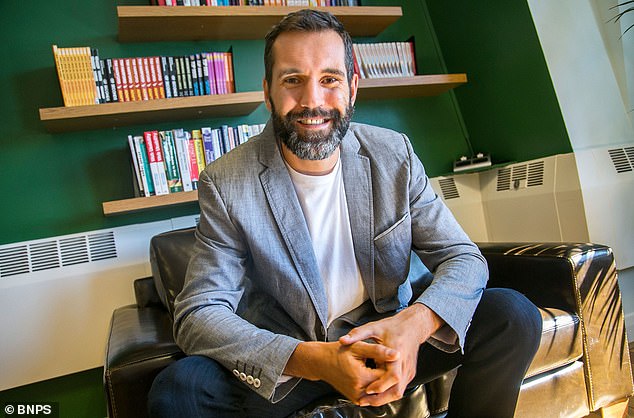MARKET REPORT: Founder of ‘legal loan shark’ Amigo left friendless after failed attempt to unseat the board
The founder of Amigo has thrown in the towel, promising to back away from the controversial lender after he failed to unseat the company’s board.
Multi-millionaire James Benamor wanted to oust bosses and install two of his own directors following a dire period of trading and the launch of an investigation by the Financial Conduct Authority into its lending practices.
But around 91 per cent of independent shareholders voted against him in a showdown, ending his efforts to reclaim the firm he started in 2005, which has been branded a ‘legal loan shark’ by MPs.
Amigo Loans founder James Benamor wanted to oust bosses and install two of his own directors following a dire period of trading and the launch of a probe by the FCA
Amigo is the UK’s largest guarantor lender, meaning it lends money to people who have a poor credit rating but can offer family and friends as a back-up to guarantee any missed payments.
Benamor owned nearly 61 per cent of the company ahead of the vote, but agreed not to participate in the ballot and let minority shareholders decide its fate.
On Twitter, he wished investors the best, saying: ‘They believe in the board’s vision, not mine.
‘It’s not the first time I’ve thought investors were wrong about something, but it is the most painful. Amigo will move forward with shareholders and a board that are united.’
Benamor previously said he would sell 1 per cent of the company every day if the vote failed. The prospect of months of selling pressure sent Amigo down 17.9 per cent, or 2.68p, to 12.3p.
Domino’s Pizza also plunged into the red. The takeaway staple tumbled after it said the cost of measures introduced to manage the pandemic would weigh on profit for the first half.
Investors had been betting it would benefit from customers treating themselves in lockdown.
But it said that while UK sales were up around 3.7 per cent between January and June, people were ordering less profitable items such as sides and desserts. Shares slid 5.8 per cent, or 19.8p, to 319p.
The FTSE 250 stayed in the black, rising 0.7 per cent, or 117.66 points, to 17,582.36, while the FTSE 100 rose 0.2 per cent, or 10.46 points, to 6253.25, despite a renewed sell-off of travel stocks such as Carnival – down 5.9 per cent, or 80p, to 1275p – and British Airways-owner IAG, which fell 3.5 per cent, or 9.7p, to 270.5p.
The Footsie was aided by utilities group SSE climbing 9.1 per cent, or 116p, to 1385p and housebuilder Berkeley Group rising 4.1 per cent, or 175p, to 4397p after pledging to keep their dividends.
SSE was at the top of the Footsie leaderboard on its plans to hand back a final dividend of 56p per share, despite profit before tax falling 55 per cent to £588million and a warning that it will take a hit of up to £250million from the coronavirus as electricity demand falls and the numbers of customers who can’t afford to pay their bills rises.
Berkeley said revenues and profits fell 35 per cent in the year to April 30, as developments in London were completed.
It is committed to handing back £280million to shareholders each year until 2025, and will work out how much of this is paid in a dividend in August.
Elsewhere, contractor Serco shot 15.7 per cent, or 20.9p, higher to 153.9p, making it the top gainer on the FTSE 250, after it restated its financial guidance.
Its work during the pandemic has included running the UK’s first drive-through testing centre – but first-half revenues have also been boosted by its takeover of a naval business last year, and will rise around 23 per cent in total.
It withdrew guidance in early April during the early stages of the pandemic – but now expects annual revenues will reach £3.7billion (up from £3.4billion-£3.5billion) and profits of between £135million and £150million (previously £145million).

